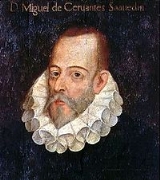
9 October 1547; died 23 April 1616) was a Spanish
novelist, poet
, and playwright
. His magnum opus
, Don Quixote, considered the first modern novel
, is a classic of Western literature
, and is regarded amongst the best works of fiction ever written. His influence on the Spanish language
has been so great that the language is often called la lengua de Cervantes ("the language of Cervantes").
A father may have a child who is ugly and lacking in all the graces, and the love he feels for him puts a blindfold over his eyes so that he does not see his defects but considers them signs of charm and intelligence and recounts them to his friends as if they were clever and witty.![]()
You are a king by your own fireside, as much as any monarch in his throne.![]()
I was so free with him as not to mince the matter.![]()
They can expect nothing but their labor for their pains.![]()
En un lugar de la Mancha, de cuyo nombre no quiero acordarme, no hace mucho tiempo que vivía un hidalgo de los de lanza en astillero, adarga antigua, rocín flaco y galgo corredor.![]()
Which I have earned with the sweat of my brows.![]()
By a small sample we may judge of the whole piece.![]()
Put you in this pickle.![]()
Can we ever have too much of a good thing?![]()
The charging of his enemy was but the work of a moment.![]()

